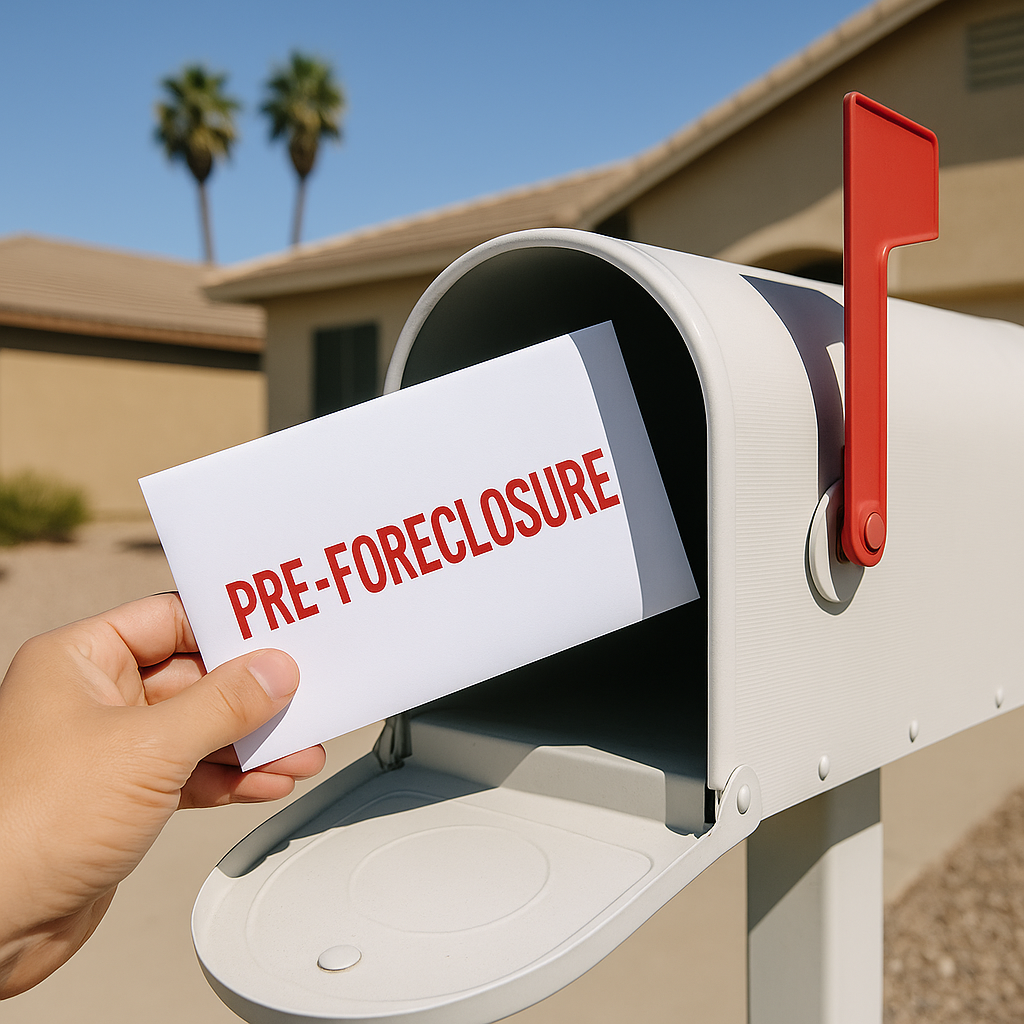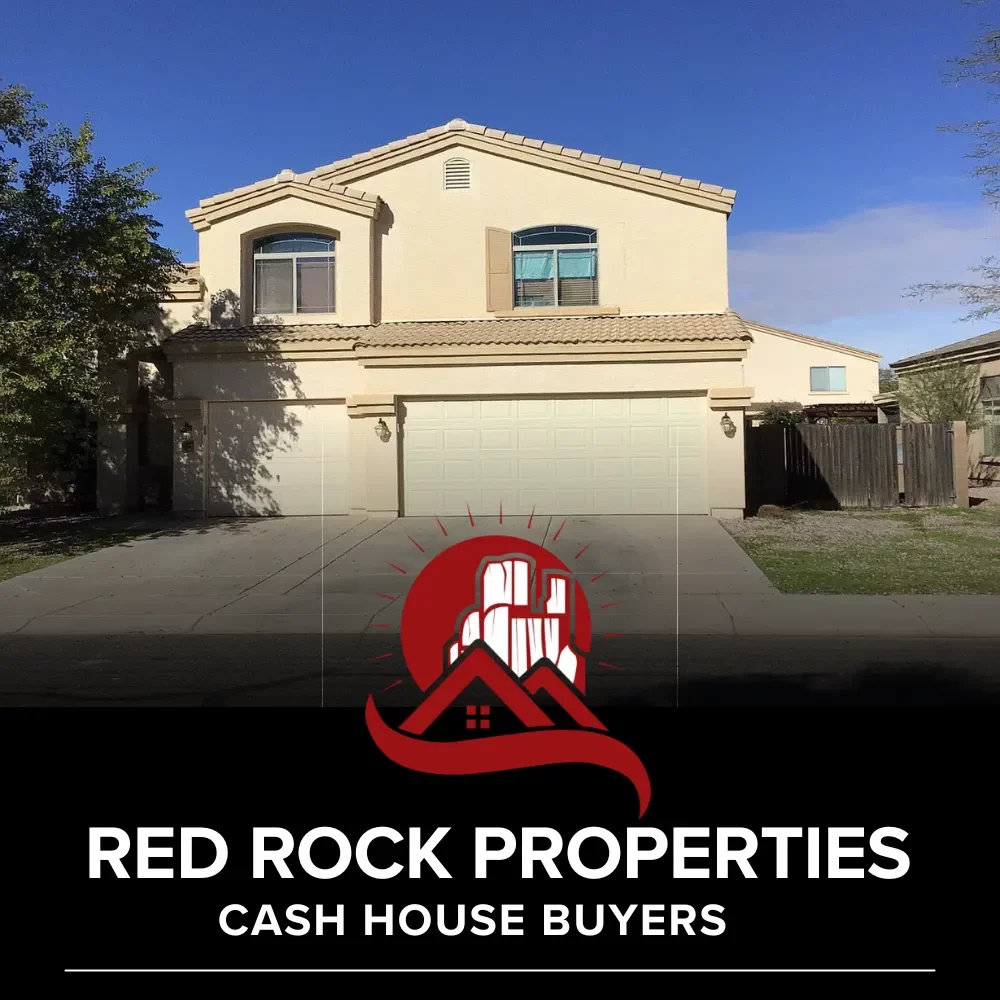Summary: This guide walks Phoenix homeowners through selling a house in pre-foreclosure under Arizona’s non-judicial trustee’s sale system. It defines what “pre-foreclosure” means, outlines the Notice of Trustee’s Sale (NOTS) process and associated timeline (minimum 90 days), and explains that during this period, owners still have options. The article explores alternatives like reinstating payments, forbearance, loan modification, listing with an agent, or doing an as-is cash sale before the auction. It also lists the documents needed, steps for a cash sale, common roadblocks (junior liens, HOA issues, code violations), and Phoenix-specific tips (responding to lender mail, keeping utilities on, acting early). Finally, it includes a FAQ section covering key questions about closing speed, avoiding foreclosure, and whether selling during pre-foreclosure is allowed.
Table of Contents

- What “Pre-Foreclosure” Means in Phoenix
- Missed Payments
- Notice of Trustee’s Sale (Arizona Process)
- Arizona Timeline (Simple Walkthrough)
- Your Options (Pros & Cons)
- Reinstate / Forbearance
- Loan Modification / Refinance
- List with an Agent
- Sell as-is for Cash
- Documents You’ll Need
- How Cash Sale Works in Phoenix (Step-by-Step)
- Common Roadblocks & Fixes
- Junior Liens
- HOA Issues
- Code Violations
- Phoenix-Specific Tips
- FAQ
Finding yourself facing foreclosure can be a scary and overwhelming experience. Chances are, you have a ton of questions and feel unsure about the road ahead. When it comes to Arizona, it uses a statewide, non-judicial trustee’s sale process with a clear timeline, which is good news since it gives you the opportunity to get ahead of the proceedings.
Whether you’re looking to sell your house fast in Phoenix or try to keep the property, it’s important to know the right steps to follow. We’ve created this comprehensive guide detailing how to sell house in pre foreclosure Phoenix residents can use to better understand their options.
What “Pre-Foreclosure” Means in Phoenix
Many people have heard of property foreclosure, when a bank retakes possession of a mortgage property. This action happens because the owner has defaulted or failed to keep up with their mortgage payments. But what does pre-foreclosure mean, specifically in Phoenix, AZ?
Pre-foreclosure is when the homeowner has failed to pay their mortgage, but their lender hasn’t yet started a foreclosure. Pre-foreclosure acts as a limited window of time for the homeowner to act before they lose their home. So, what does the pre-foreclosure process look like?
Missed payments
Falling behind on your mortgage payment triggers the lender to begin the pre-foreclosure process. While the number of payments a homeowner can miss before pre-foreclosure varies by lender, it’s typically between 3 and 6.
The good news is that if you can start making payments again, you will no longer be in breach of contract, and the pre-foreclosure process stops. However, if payment isn’t made, the trustee may record a Notice of Trustee’s Sale if the lender proceeds.
Notice of Trustee’s Sale (Arizona Process)
Arizona primarily uses a non-judicial trustee’s sale (not a court foreclosure). After missed payments and required lender notices under the deed of trust, the lender may instruct the trustee to record a Notice of Trustee’s Sale in Maricopa County. The sale date must be set at least 90 days after the NOTS is recorded. During that period, you can often reinstate, sell, or work out options—but acting early gives you the most flexibility.
How notice is given (trustee’s sale requirements):
- Recorded with the county recorder where the property is located.
- Mailed by registered or certified mail to the borrower and other interested parties within 5 business days after recordation.
- Posted in a conspicuous place on the property at least 20 days before the sale.
- Published in a newspaper of general circulation once a week for four consecutive weeks before the sale.
- On the scheduled date, the property is offered at a public auction. The highest bidder receives a Trustee’s Deed. If there are no third-party bidders, the lender may make a credit bid (up to the amount owed) and take title.
Disclaimer: This information is for educational purposes only and is not legal advice.
Arizona Timeline (Simple Walkthrough)

Now that you have a better understanding of the pre-foreclosure, let’s discuss how long the process can take. Since it’s considered a non-judicial process, once a Notice of Trustee’s Sale is recorded, the auction date must be set at least 90 days later. The total timeline varies depending on lender and situation.
As we discussed earlier, lenders begin eyeing a property for pre-foreclosure after 3 to 6 missed payments. During this time, they’ll try to contact you to explore your payment options. To avoid foreclosure, many owners either reinstate/enter a workout with the lender or sell the property (including an as-is cash sale) before the auction. Early action is the best way to avoid foreclosing on your house, since the longer you wait, the further the process will progress.
It’s important to communicate with your lender and discuss your financial situation. They’re often willing to work with you and create a solution that lets you keep your property. After several missed payments (often ~3–6), the trustee may record a NOTS; the sale date must be at least 90 days after recordation.
Your Options (Pros & Cons)
If you’re unable to pay your mortgage, you do have options. We’ll explore the pros and cons of each below.
Reinstate/ forbearance
If you’re falling behind on your mortgage payments because of a temporary financial setback like a natural disaster, illness, or a job loss, you may qualify for a forbearance. A forbearance is a temporary reduction or pause in your mortgage payments for an agreed-upon period of time.
Forbearance is a good option to avoid pre-foreclosure, but it’s not a permanent solution. You must still pay back the missed payments, and they’ll typically still accrue interest. It’s important to note that you must request forbearance from your lender and provide them with proof of hardship.
After the forbearance period ends, you can restore your delinquent mortgage through reinstatement. This option is a one-time payment covering the full amount of the missed charges. Included in this balance are any interest and late fees. Reinstatement is the fastest and best way to get your loan back on track after forbearance, but due to the large lump sum, it may not be a feasible option.
Loan modification/ refinance
Some lenders may allow you to either modify or refinance your loan. A loan modification changes your original loan’s terms, often making your payments more manageable. This choice is a good option for financial hardship cases like divorce, disability, or job loss, but you must show proof of your financial situation. Loan modification generally has no or low upfront fees, but it could have a negative impact on your credit score.
With refinancing, you replace your current mortgage with a new one to get a shorter term, lower interest rates, or access your home’s equity. You must have a stable income, good credit, and enough existing equity to qualify and expect to pay between 2 and 6% of the loan amount in closing fees.
List with an agent
Listing with an agent can work, but it’s rarely fast. It often requires repairs, showings, and commissions, and time on market can stretch to months.
Unfortunately, selling your property with a realtor is often time-consuming and costly. To sell a house in pre foreclosure Phoenix residents can expect listing with an agent to take months and usually requires repairs, showings, and commissions. You’ll also need to make any necessary repairs beforehand to ensure the property passes inspection. During its time on the market, there are open houses and showings, which can be a hassle and never guarantee a buyer.
Finally, your realtor will earn a 5 to 6% commission on the sale price, which, when paired with the amount you’ll need to repay on your mortgage, can cut deeply into the amount you’ll receive after the sale. Prefer a faster route? Start here: cash home buyers in Phoenix.
Sell as-is for cash before auction
With an as-is cash sale Phoenix residents can sell their property quickly without the hassle of listing with an agent. You don’t have to worry about making expensive repairs or waiting months for the sale; you get the certainty of knowing you can offload your house quickly and avoid foreclosure.
The key is choosing a cash buyer like Red Rock Properties with a proven track record of success that offers a fair cash offer based on the property’s condition and recent local sales. If you need to sell a Phoenix house fast, work with a local, reputable cash buyer. For many, selling a house as-is is the best way to avoid the pain of foreclosure.
Documents You’ll Need
To sell your house quickly, you’ll need to make sure you have all the necessary documents. These include:
- Recent mortgage statement
- Payoff/ reinstatement quote
- Your ID
- HOA/ tax status
- Any liens or notice letters
You can find foreclosure documents in Phoenix at the following:
- Maricopa County Recorder’s Office
- Maricopa County Assessor’s Office
- Maricopa County Treasurer’s Office
Don’t wait until the foreclosure process begins; it’s important to decide which option works best for you and move quickly.
How Cash Sale Works in Phoenix (Step-by-Step)

A cash sale in Phoenix is fast and easy with Red Rock Properties. There’s no commissions, and we cover standard seller closing costs (owner’s title policy, escrow/settlement, recording, and transfer tax where applicable). Seller pays any loan payoff, liens/judgments, delinquent taxes/HOA, or utilities owed.
The step-by-step process is as follows: Contact form → quick walkthrough → fair cash offer → title clears liens → schedule closing before sale date.
- Contact form – Fill out our online contact form or call us at 480-389-6484 to get started.
- Quick walkthrough – One of our team members will walk through your property to determine to review the property and prepare a fair cash offer.
- Fair cash offer – We provide a no-obligation offer.
- Title clears liens – We’ll assist you with clearing the title so you can sell the property.
- Schedule closing before sale date – We’ll schedule your closing before the foreclosure sale date so you can receive your all-cash payment.
Common Roadblocks & Fixes
When selling your house, there are situations that could cause a setback. Here are a few common roadblocks and how Red Rock Properties can handle them.
Junior liens
If you’ve taken a second mortgage, home equity line of credit, or home equity loan, you have what’s called a junior lien. When you sell your property, we’ll help ensure the junior lien holder is paid.
HOA issues
If there are unpaid HOA fees, you must pay them before the title is cleared. We suggest speaking with the HOA and communicating the situation to see if they’re willing to work with you.
Code violations
You don’t have to worry about fixing code violations when selling your house as-is. We provide a cash offer without the need for costly repairs or fixes.
Phoenix-Specific Tips
These tips can help you avoid and navigate the pre-foreclosure process, so you have more time to decide the best path forward.
1. Respond to lender mail
Never ignore communications from your lender. They’re more likely to work with you if you’re open and honest about your situation.
2. Keep utilities on
Turning off the utilities to your house could cause severe damage and decrease its overall value. Keeping them on will help you prevent mold growth, damage to the HVAC unit, electrical issues, and more.
3. Act before a sale date is set
If a sale date is already set, it’s not too late, but your timeline is tight. Act immediately to sell or reinstate before the auction.
4. Work with a local title company
Working with a local title company ensures they understand Phoenix laws and can lead you in the right direction.
FAQS
Q1: Can I sell my house during pre-foreclosure in Phoenix?
Yes. Arizona uses a non-judicial trustee’s sale. After a Notice of Trustee’s Sale is recorded, the auction must be set at least 90 days out. Many owners sell the home before the sale date—acting early gives you more choices.
Q2: How fast can a cash sale close?
In many cases, about 7 days, depending on title and payoff info. No commissions, and we cover standard seller closing costs. You’re responsible for any loan payoff, liens/judgments, and past-due taxes/HOA or utilities.
Q3: Will selling avoid a foreclosure on my record?
A completed foreclosure appears on your record; selling before the auction can help you avoid that outcome. Late payments may still show. This is general information—talk with your lender for specifics.
Sell Your Phoenix House Quickly Today
If you’re ready to sell before the sale date, get a fair cash offer from Red Rock Properties. Our professional team understands the Phoenix housing market and can give you top-dollar for your as-is property. Contact Red Rock Properties today at 480-389-6484 or visit our Phoenix home buying page to sell your house quickly!
![we buy houses for cash [market_state]](https://image-cdn.carrot.com/uploads/sites/77125/2023/12/We-Buy-Houses-Cash-Home-Buyers-Arizona.jpeg)

